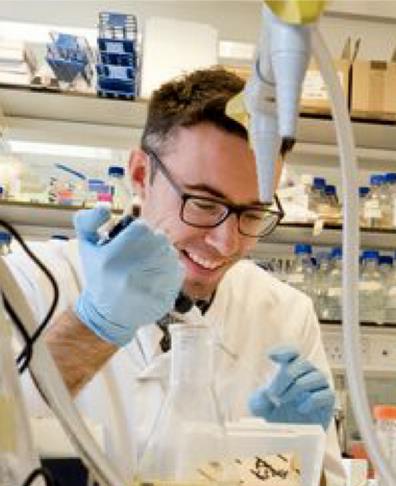
User Story: Understanding the proteomic signature of the zebrafish embryonic kidney (the pronephros)
Understanding the proteomic signature of the zebrafish embryonic kidney (the pronephros)
Name: Richard Naylor

Position when you did the work: Postdoc (RA)
Who’s lab were you in: Lennon laboratory
What was the biology you were studying:
I wished to identify the proteomic signature of the pronephros in the zebrafish. Antibodies have not be optimised for use in zebrafish and so reliance is instead on RNA signatures (either by in situ hybridisation, qPCR or RNA-seq). However, transcript levels do not always correlate with protein levels and in most biological contexts, the protein is the functional component. The BioMS facility provided the opportunity to analyse the protein content of isolated pronephroi of 5 day old zebrafish.
What workflows/methods did you use in the facility:
I used the S-trap method to generate peptides from whole (non-fractionated) pronephric tissue. The QE mass spectrometer was then used for the analysis (90minutes run time)
What was it like performing the experiments:
Performing the experiments was very straightforward. Ronan was nearly always around to aid me and we had many preliminary chats about what I wanted to achieve and the protocol outline before I started.
What did you find out from the experiments:
The results of the experiments continue to provide information. This was the first time that a proteome signature of the pronephros had been performed. One major outcome was the discovery of a specific molecule utilised at this stage of development in nephrogenesis – I found that integrin α1β1 is the major receptor for cell adhesion. This informed me of the potential regulation of cell division in the kidney, and I subsequently knocked out itga1 and itgb1a (the genes encoding integrin α1β1) and found they reduced cell division in the kidney. This result has made a major contribution to my hypotheses, which I am using to apply for fellowships currently.
Is there anything you wished someone had told you before doing the experiments:
I cannot think of anything. There is a lot of information to take in and it is impossible to understand the protocol without just going ahead and doing it. In my opinion it is always better getting information as you go through a process. Ronan and Julian were very helpful in responding to any questions I had throughout the experiments.
Do you mind people asking you for advice?
Sure thing, Richard.naylor-2@manchester.ac.uk
Have you published the work?
Not yet (experiments were performed at the end of 2019). But I have used the data to apply for an Intermediate Fellowship from Kidney Research UK (https://kidneyresearchuk.org/research/research-grants/fellowships-and-phd-studentships/)
Tags: #userstories






0 Comments